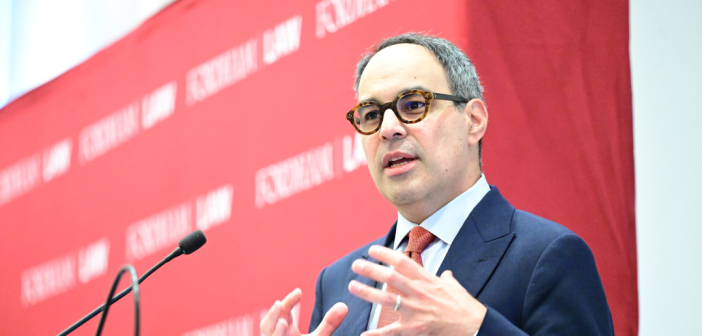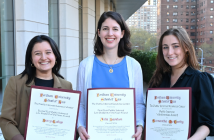Political debates, controversies, and scandals—including alleged corruption and bribery during the bidding process to host the 2022 FIFA World Cup and accusations of human rights violations in the host country of Qatar—swirled in the years, and even weeks, leading up to the world’s most-watched sports tournament. Now less than three years from the next World Cup, which will take place across 16 cities in the United States, Mexico, and Canada in 2026, Jonathan Kanter, assistant attorney general of the U.S. Department of Justice (DOJ)’s Antitrust Division, declared that collusive schemes are top of mind for the three host countries.
“The sheer number of goods and services provided for the games, from stadium construction to hospitality and tourism, raises the prospect of bid-rigging, price-fixing, fraud, and other forms of collusion,” said Kanter during a keynote at Fordham Competition Law Institute’s 50th Annual Conference on International Antitrust Law and Policy, held Sept. 20-22. Through this joint initiative, the DOJ, Mexico’s Federal Economic Competition Commission, and Canada’s Competition Bureau will collaborate on investigations to detect and prosecute such schemes as well as outreach to the public and business community about anti-competitive conduct.
“We’re going to make sure this conduct is stopped,” Kanter added. “Joined by our international counterparts, we are now officially the cops on the beat.”
The Future of Antitrust Law
 The FIFA scandal was one of more than a dozen topics debated at the annual conference, which brings together antitrust practitioners and enforcers and legal scholars from across the international community to discuss the current state of antitrust law and policy, the complex issues surrounding new legislation, and what the future holds for the field. Other global thought leaders who spoke at this year’s conference included Olivier Guersent, director-general of the Directorate General for Competition at the European Commission; Herbert Hovenkamp, James G. Dinan University Professor at University of Pennsylvania Carey Law School; Lina Khan, chair of Federal Trade Commission (FTC); and Fordham Law Professor Zephyr Teachout.
The FIFA scandal was one of more than a dozen topics debated at the annual conference, which brings together antitrust practitioners and enforcers and legal scholars from across the international community to discuss the current state of antitrust law and policy, the complex issues surrounding new legislation, and what the future holds for the field. Other global thought leaders who spoke at this year’s conference included Olivier Guersent, director-general of the Directorate General for Competition at the European Commission; Herbert Hovenkamp, James G. Dinan University Professor at University of Pennsylvania Carey Law School; Lina Khan, chair of Federal Trade Commission (FTC); and Fordham Law Professor Zephyr Teachout.
In a keynote address, Khan provided updates on the FTC and DOJ’s latest proposed merger guidelines that seek to close the gap between prevailing law and agency practice. Proposed in July 2023, this update aims to better reflect how the agencies determine a merger’s effect on competition and evaluate proposed mergers under the law.
“As we finalize the guidelines, our goal is to reinvigorate the full scope of the law while ensuring that our merger analysis is dynamic enough to address the myriad ways that consolidation and unlawful mergers can threaten Americans as consumers, workers, and business people,” said Khan. “We cannot predict the many ways that markets and business strategies will evolve, but we can commit to staying vigilant, updating our tools and frameworks when the facts call for it, and using the full scope of our authorities to safeguard free and fair competition for the American people.”





